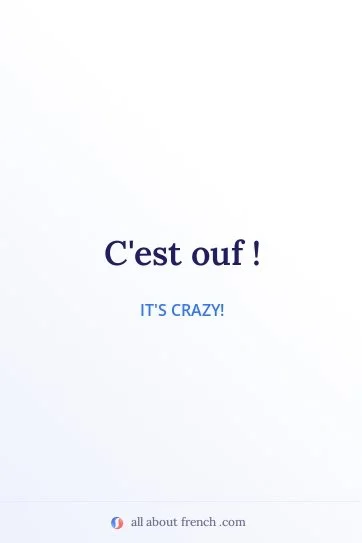
We are going to show you everything you have to know about the funny French phrase "C'est ouf !". Including a full explanation of what it is and how you can use it in everyday life with an audio example. Along with the cool things we added like slow pronunciation audio, synonyms, dialogue example and more!
Translation : It's crazy!
Register : Informal - Funny - Slang
Slow
Normal
IPA : / sɛt- uf ! /

The literal meaning is:
It means "It's amazing/crazy" and aims to describe an incredible experience, story, place, person... or anything exceptional. It's generally used positively, even though not always, just like in English "It's crazy" can be negative.
This expression was at first very "slangish" and familiar, reserved to very young people. But with time it became so popular that a lot of people from different generations are using it right now! (It's still familiar though.)
You probably won't see it in French classes because the "academic" way to say it would be "C'est fou". And that's precisely where this expression is coming from. The original word got twisted into a new (more cool) one by a mechanism we call "verlan".
More on that in the "Fun fact" paragraph...
You are visiting Paris and someone asks you what you think of the city, you can say: "C'est ouf !" (That's amazing!) but also the similar version: "C'est un truc de ouf !" (That's something amazing!)
You can also use it in a sentence, for example: "J'ai découvert qu'on va bientôt conquérir la planète Mars. C'est ouf !" (I discovered that we will soon conquer planet Mars. That's crazy!)
If what you are talking about happened in the past, use instead "C'était ouf !" (It was amazing!) or "C'était un truc de ouf !" (It was something crazy!)
And if it will happen in the future, you can say: "Ça va être ouf !" (It will be amazing!) or "Ça va être un truc de ouf !" (It will be something crazy!)
This expression is a part of what we call "verlan" vocabulary. To make a word "verlan" you have to pronounce it backwards, so "fou" becomes "ouf" just like "bien" becomes "ienb".
But why are we calling it "verlan"? Because the word "verlan" is the "verlan" of "à l'envers" which means "upside down / backwards". Crazy huh?
↓ Example in a story with French audio ↓
Finally, let's see an example in a parallel story with slow audio.
Les Alpes
The Alps
10%
The story just started!
Get full access to 365 texts and quizzes, including this one.
 Discover more
Discover more Already a member? Full story and quiz here.
